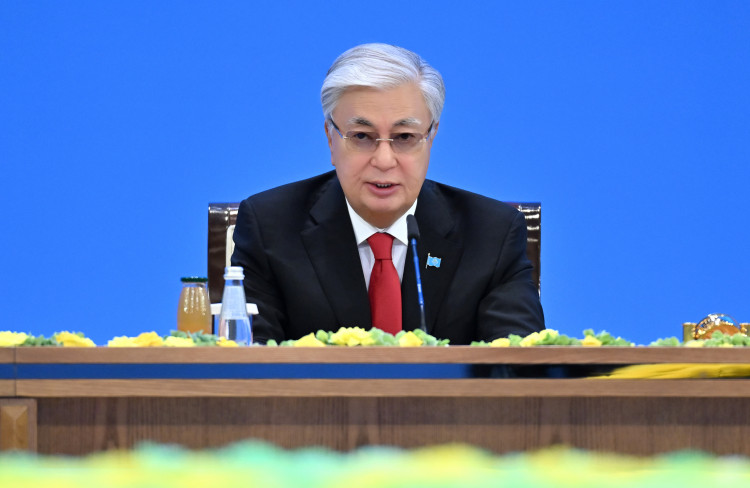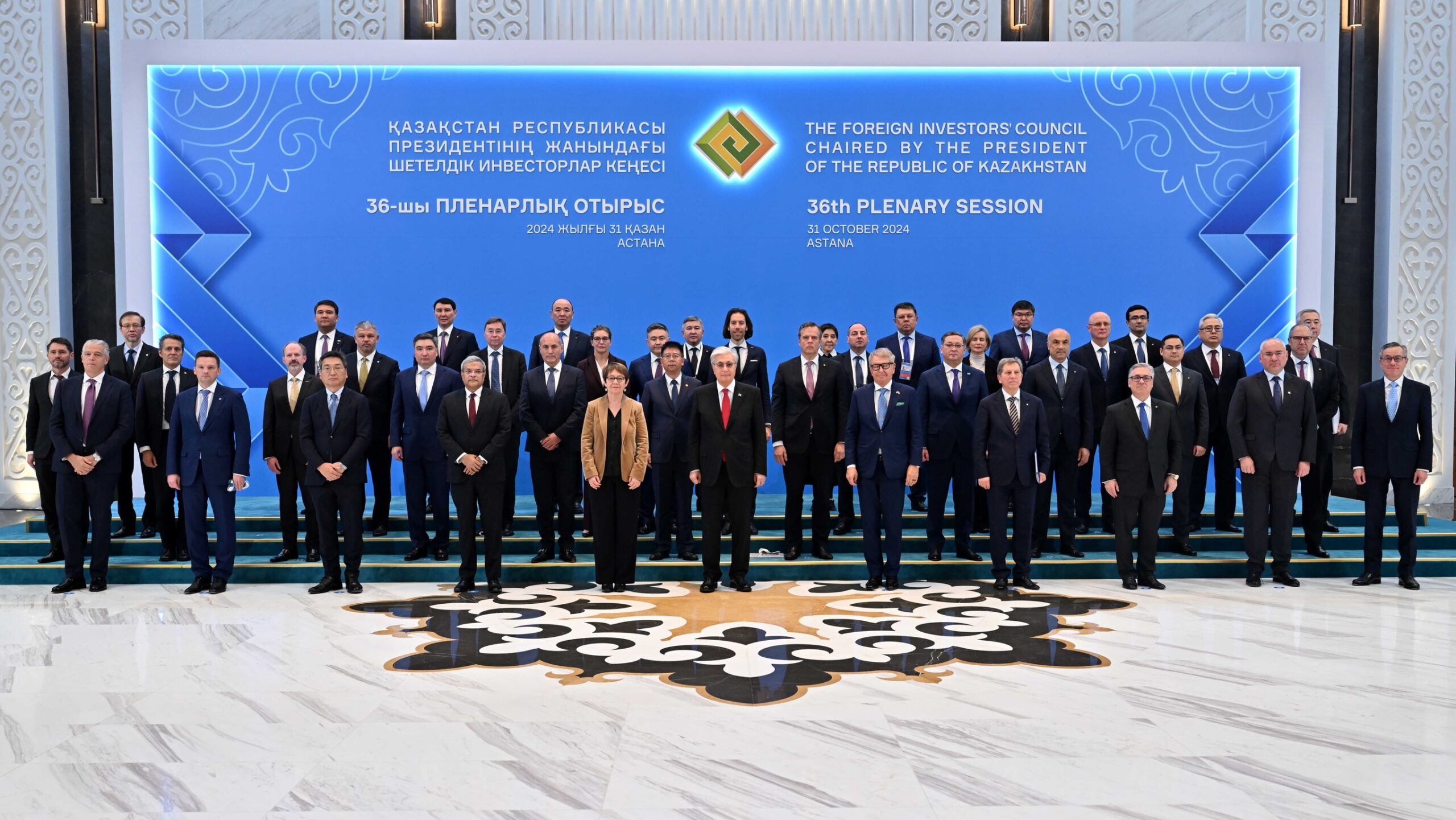ASTANA – Kazakh President Kassym-Jomart Tokayev outlined key investment areas and promised to keep taking consistent systematic actions to improve working conditions for the country’s investors during the 36th plenary session of the Foreign Investors’ Council, which took place at the Palace of Independence on Oct. 31.

Kassym-Jomart Tokayev discussed the topics of investor rights protection and regulatory policy improvement. Photo credit: Akorda.
Welcoming the event participants, Tokayev noted that the council has become the most important venue for discussing topics related to improving the investment climate, reported the Akorda.
Referring to data from the International Institute for Management Development (IMD), he emphasized that Kazakhstan has entered the top 35 most competitive countries in the world.

According to Kassym-Jomart Tokayev, the Foreign Investors’ Council has become the most important venue for discussing topics related to improving the investment climate. Photo credit: Akorda.
“We have set a rather ambitious goal – to attract an additional $150 billion in foreign direct investment by 2029. To achieve this goal, the country’s Investment Headquarters has been granted expanded powers to promptly resolve emerging problems. In May, I signed a decree that strengthened the basis for significant liberalization of the national economy. We will continue consistent systemic steps aimed at improving the working conditions for investors in the country,” the President said.
Geological exploration & mining
Tokayev emphasized Kazakhstan’s unique mineral resource base and discussed measures to increase the efficiency and transparency of operations in geological exploration and mining. According to him, during the last six years, Kazakhstan has received more than $1 billion in private investment in geological investigation.
Currently, nearly 1.6 million square kilometers of the country’s territory are available for obtaining subsoil use rights for geological exploration.
“The recently adopted National Infrastructure Plan until 2029 opens a window of opportunity for local manufacturers. Approximately 200 major infrastructure projects will be implemented, estimated at more than $86 billion. The government will form a list of goods for the localization of off-take contracts. Industrial progress requires a highly trained workforce. That is why I declared 2025 the Year of Vocational Professions. We are looking for investors ready to improve the quality of technical and vocational education in Kazakhstan and develop the corresponding infrastructure,” the President said.
Energy sector
Describing the situation in the energy sector, Tokayev noted the merits of international oil companies, which played an important role in the country’s development.
“Foreign investors invested capital, provided advanced technologies and highly qualified labor. Their investments contributed to the growth of our energy sector: over the past 30 years, oil production has tripled. Thanks to this, Kazakhstan entered the top five countries with high rates of oil production growth. Speaking about the future, we set a goal to exceed the threshold of 100 million tons per year,” the President said.
The expansion of the petrochemical industry is also key to diversifying the economy.
“In 2022, we launched the largest polypropylene plant in Central Asia with an annual capacity of 500,000 tons. Today, this enterprise covers almost 60% of domestic demand and exports products to Europe, Türkiye and China. In September, the construction of a polyethylene plant with a capacity of 1.2 million tons per year began. A number of petrochemical projects worth more than $14 billion are under development,” said Tokayev.
Clean energy sector
Tokayev also talked about making the renewable energy sector more appealing to investors. Specifically, agreements were established with worldwide businesses such as Total, Svevind, ACWA Power, and Masdar to develop 43 gigawatts (GW) of green projects in Kazakhstan. Kazakhstan also has significant potential for developing nuclear energy.
“Kazakhstan is the world’s largest uranium producer. As you know, citizens recently supported the construction of the first nuclear power plant in a national referendum, which will serve as a long-term investment in our energy security. We are currently considering the possibility of creating an international consortium to implement this project,” said the President.
Agro-industrial sector
The focus of the meeting was also the agro-industrial sector.
“Agricultural development in Kazakhstan is a strategic priority for Central Asia’s food security. Kazakhstan is sixth in the world in terms of agricultural land area, with over 200 million hectares. Over the last six years, industrial exports have risen and surpassed $5 billion. As we work to turn the agro-industrial complex into a high-tech industry, over 100 projects worth $5 billion will be realized with the involvement of international investors,” Tokayev said.
Transport & logistics sector
Kazakhstan intends to improve its position as an important Eurasian transit hub in the transportation and logistics sectors. The country plans to repair 11,000 kilometers of old railways and build over 5,000 new ones. The Trans-Caspian International Transport Route is the top priority, thus investments in infrastructure development, such as the construction of new cargo facilities and the production of transport ships, receive special attention.
Investor rights protection
Tokayev also addressed the topics of investor rights protection and regulatory policy improvement.
One of the goals of the ongoing modernization of the legal and judicial systems has been to establish a favorable investment climate. The government’s digital interaction with investors is increasing. The National Digital Investment Platform, which will allow real-time monitoring of project implementation, is expected to be launched by the end of this year. The new Tax Code will help to activate the investment cycle by introducing tax preferences, the most important of which is the ability to deduct all expenditures related with the purchase of machinery, equipment, and software.
Kazakhstan is focused on the work of the Astana International Financial Centre (AIFC) as part of its efforts to develop financial cooperation. The AIFC is a unique regional entity that incorporates the finest practices of the world’s leading financial hubs.
The President emphasized the need of continuing the dialogue between council members and government agencies aimed at enhancing the country’s investment climate, adopting new initiatives, and implementing specific projects.
